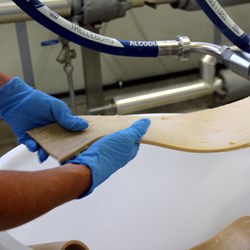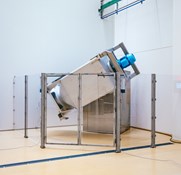


Food companies face complex challenges when developing vegan products. These range from taste through health to the texture of the product. Nor should the production process be overlooked.

© Food Pilot
Creating plant-based alternative products with sensory appeal and a good health profile requires expertise in product development. The taste of vegetable and animal and milk proteins cannot be compared. Plant proteins have a different composition from meat proteins and can also lend an undesirable product flavour. Furthermore, most plant proteins other than soya lack one or more essential amino acids. One solution is to combine several types of vegetable protein, but then the risk of allergies increases. Alternative plant products lack iron, selenium and zinc as well as vitamins B12 and D, all of which are sufficiently present in meat.
Nor can anti-nutritional factors, such as trypsin inhibitors and lectins, be ignored. These have an adverse effect on the digestion and on the absorption of the food. Allergens and anti-nutritional factors can be reduced by heating.
Functional properties
An essential precondition when replacing animal protein with plant protein is the maintenance of its functional properties. Structure is an Achilles heel for most meat substitutes. Meat proteins cannot be replaced on a one-to-one basis.

© Food Pilot
Technological challenges
The challenge when manufacturing vegan products is to translate knowledge of the functions of plant ingredients into optimal process parameters for the entire production process: from raw material to finished product. This requires no more than application know-how. Extrusion processes are used for the production of plant-based meat substitutes. A recent Danish technological development has made it possible to imitate muscle tissue, using plant fibres, proteins, fats and water. Low thermal and mechanical energy transform the plant proteins into a three-dimensional open fibre structure.
Collaboration
Further development of vegan products requires close collaboration between food companies, suppliers of ingredients, and technology and knowledge institutions. The vegan market is growing very fast. What's important is to create a win-win situation, where everyone benefits.

What exactly will today's consumers want on their plates tomorrow? It is with this rather tricky question in mind that food companies are constantly striving to develop products that meet the needs of even the most discerning gourmets.

Protein-enriched food products offer convenience for those who should or would like to consume more protein. Generally, it is not necessary to consume these products.

“We are receiving a growing number of enquiries from our clients on the prevention of cross-contamination in the mixing and packaging of dry ingredients for the food industry", says Domien Sierens of Food Blending. “Hygiene and quality assurance are our top priorities".

At the Tavola gastronomic trade fair, from 17-19 March, Maisonie will launch four flavours of dessert with extra protein. In nutritional terms, two are sources of protein and two are rich in protein, Nathalie Van der Straeten tells us. She also reveals which plant proteins have been added.